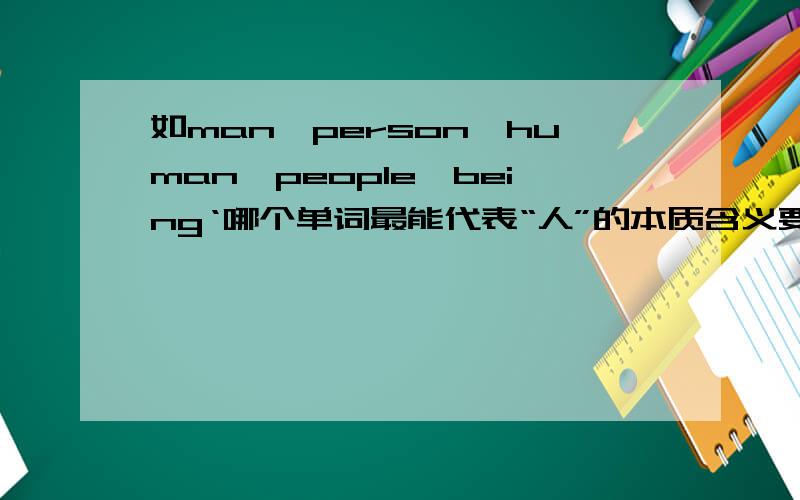如man,person,human,people,being‘哪个单词最能代表“人”的本质含义要原因我要理由,谢谢
来源:学生作业帮助网 编辑:作业帮 时间:2024/09/29 21:38:36

如man,person,human,people,being‘哪个单词最能代表“人”的本质含义要原因我要理由,谢谢
如man,person,human,people,being‘哪个单词最能代表“人”的本质含义
要原因
我要理由,谢谢
如man,person,human,people,being‘哪个单词最能代表“人”的本质含义要原因我要理由,谢谢
human/human being 表达的是人类
而man 和 person就是普通的人,people则是person的复数形式
man不仅可以表达为男人,也可以用来表达人,不要被教材误导了
肯定是human啊,也可以用human being。
human
human
一般用human being
人之初,human。
man是指男人,person是指这个人,human是指人类,people是人们,民族
man男人
person人
human人类
people人们
我觉得是human,因为在美国他比较常用
man → 指各时代的全体人类
man 1
/ mæn; mæn/ n (pl men / men; mɛn/)
[C] adult male human being 男人; 成年男子: clothes for men 男人的服装.
[C] human being of either sex; person 人(男女均可...
全部展开
man → 指各时代的全体人类
man 1
/ mæn; mæn/ n (pl men / men; mɛn/)
[C] adult male human being 男人; 成年男子: clothes for men 男人的服装.
[C] human being of either sex; person 人(男女均可): All men must die. 人皆有一死. * Growing old is something a man has to accept. 逐渐衰老是任何人都得承认的事实.
[sing] (without the or a 不加the或a) the human race; mankind 人类: Man is mortal. 人终有一死. * the origin of man 人类的起源 * medieval man, ie all people in the Middle Ages 中世纪的人类. =>Usage 见所附用法.
[C] husband, male lover, boy-friend, etc 丈夫; 男情人; 男朋友: Her man's been sent overseas by his employers. 她的丈夫已被雇主派到海外. * be made man and wife, ie be married 结成夫妻.
[C usu pl 通常作复数] male person under the authority of sb else (男性的)下属: officers and men in the army, navy, etc 陆军、 海军等的官兵 * The manager gave the men (ie the workers) their instructions. 经理给雇员下达了指示.
[sing] (fml 文) manservant; valet 男仆; 贴身男仆: My man will drive you home. 我的仆人将开车送你回家.
[C] (fml 文) present or former member of a named university (与校名连用)大学生, 大学校友: a Cambridge man 剑桥大学学生 * a Yale man 耶鲁大学学生.
[sing] (infml 口) (used as a form of address, usu in a lively or an impatient way 用作称呼, 通常含轻松或不耐烦的语气): Hey, man, are you coming? 嘿, 老兄, 你来吗? * Be quiet, man! 老弟, 安静点!
[C] male person with the qualities of courage, toughness, etc often associated with men 男子汉; 大丈夫: Be a man! ie Be brave. 要做个大丈夫(拿出勇气来)! * They acquitted themselves like men. 他们表现得像男子汉.
[C] piece used in games such as chess, draughts, etc (国际象棋、 国际跳棋等的)棋子: capture all sb's men 吃掉某人所有的棋子.
person
/ ˈpɜːsn; ˋpəsn/ n (pl 复数作 people / ˈpiːpl; ˋpipl/ or, in formal or derogatory use, 作郑重或贬抑用词时复数作 persons). =>Usage at people 用法见people.
human being as an individual with distinct characteristics(有某种个性或特性的)人: He's just the person we need for the job. 他正是我们需要的做那种工作的人. * Hereshe is the very person we were talking about! 就是她--我们刚刚谈到的那个人. * I had a letter from the people who used to own the corner shop. 我收到从前街角那家商店的老板寄来的一封信.
(fml or derog 文或贬) (esp known or unspecified) human being (尤指已知的或非特指的)人: A certain person (ie somebody that I do not wish to name) told me everything. 有个人把一切都告诉我了. * Any person found leaving litter will be prosecuted. 禁扔垃圾, 违者必究. * (law 律) accused of conspiring with person or persons unknown, eg said when charging sb in court 被控与人合谋(如於法庭控告某人所说).
(grammar) any of the three classes of personalpronouns, the first person `I/we' referring to the person(s) speaking, the second person `you' referring to the person(s) spoken to, and the third person `he, she, it, they' referring to the person(s) or thing(s) spoken about 人称(第一人称I/we指谈话者, 第二人称you指谈话的对象, 第三人称he、 she、 it、 they指谈及的人或事物).
human
/ ˈhjuːmən; ˋhjumən/ adj
of or characteristic of man (contrasted with God, animals or machines) 人的, 显示人的本性的(以别於神的、 动物的或机器的): a human skull 人的头盖骨 * human anatomy, affairs, behaviour 人体解剖学、 人的事情、 人的行为 * a terrible loss of human life 人命的巨大损失 * This food is not fit for human consumption. 这种食物不宜人类食用. * We must allow for human error. 我们应该考虑到有人为的错误. * Even she makes mistakes occasionally she's only human. 即便是她偶尔犯一些错误--她也是人哪.
(approv 褒) having or showing the better qualities of man; kind; good 有良好品性的; 有人情的; 好心肠的: She'll understand and forgive; she's really quite human. 她是能谅解的, 她是个大好人.
people
/ ˈpiːpl; ˋpipl/ n
[pl v] persons 人: Were there many people at the party? 聚会上的人多吗? * Some people are very inquisitive. 有些人好管闲事. * streets crowded with people 挤满人的街道 * He meets a lot of famous people in his job. 他在工作中常能见到许多名人. * Many old people live alone. 不少老年人都独自生活. =>Usage at man1 用法见man1.
(a) [C] (all the persons belonging to a) nation, race, tribe or community 民族; 种族; 部落; 人民: the English-speaking peoples 说英语的民族 * The Spartans were a warlike people. 斯巴达人是尚武的民族. (b) [pl v] those persons who live in a particular place or have a particular nationality 生活在某地或有某国籍的人们: the people (ie inhabitants) of London 伦敦居民 * the British, French, Russian, etc people 英国人、 法国人、 俄国人. =>Usage 见所附用法.
the people [pl v] the citizens of a country, esp those with the right to vote 国民, 公民(尤指有选举权者): The President no longer has the support of the people. 总统已失去国民的支持.
the people [pl v] ordinary persons who do not have a special rank or position in society 普通人; 平民; 民众: the common people 老百姓 * a man of the people, eg a politician who is popular with ordinary people 受民众欢迎的人(如受欢迎的政治家).
[pl v] subjects (of a king) or supporters (of a leader) (国王的)臣民; (领袖的)拥护者: a king loved by his people 受臣民爱戴的国王 * His people worked hard to get him elected. 拥护他的人都为使他当选而努力.
[pl v] (infml 口) person's parents or other relatives 父母或亲戚: She's spending Christmas with her people. 她与亲人一起过圣诞节.
being
/ ˈbiːɪŋ; ˋbiɪŋ/ n
[U] (a) existence 存在: the richest company in being today 现今实力最为雄厚的公司 * What is the purpose of our being? 我们生存的目的是什麽? (b) one's essence or nature; self 本质; 本性; 本身: I detest violence with my whole being. 我从心底里憎恶暴力.
[C] living creature 生物: human beings 人 * a strange being from another planet 来自其他星球的奇异生物.
nation,people,race
这些名词均含“民族,种族”之意。
nation → 特指居住于同一区域,有共同历史、语言、文化及心理素质等的人类群体。
people → 侧重指由有共同文化、社会基础而所形成的人民整体。
race → 专指有共同祖先和相同肤色、面部特征等遗传特征以及共同风俗等的人群。
people,masses,crowd,throng,mob
这些名词均有“人们,人群”之意。
people 最普通用词,不带任何色彩,泛指不确定数量的人们。
masses 指群众或平民,在西方国家含贬义,在我国含褒义。
crowd 本义指一大群紧紧聚集在一起的人群,现指群众整体,由个体结合的人群或大众。
through与crowd含义很接近,常可换用,但侧重指向前运动的群众。
mob 含贬义,指乌合之众、暴民。
man,mankind,humanity
这些名词均有“人类”之意。
man → 指各时代的全体人类。
mankind → 集体名词,语体庄重,泛指过去、现在和未来的人类。
humanity → 书面用词,集合名词,多用于文学作品中,作人类解时,侧重有同情心、理解力和崇高品质。
收起